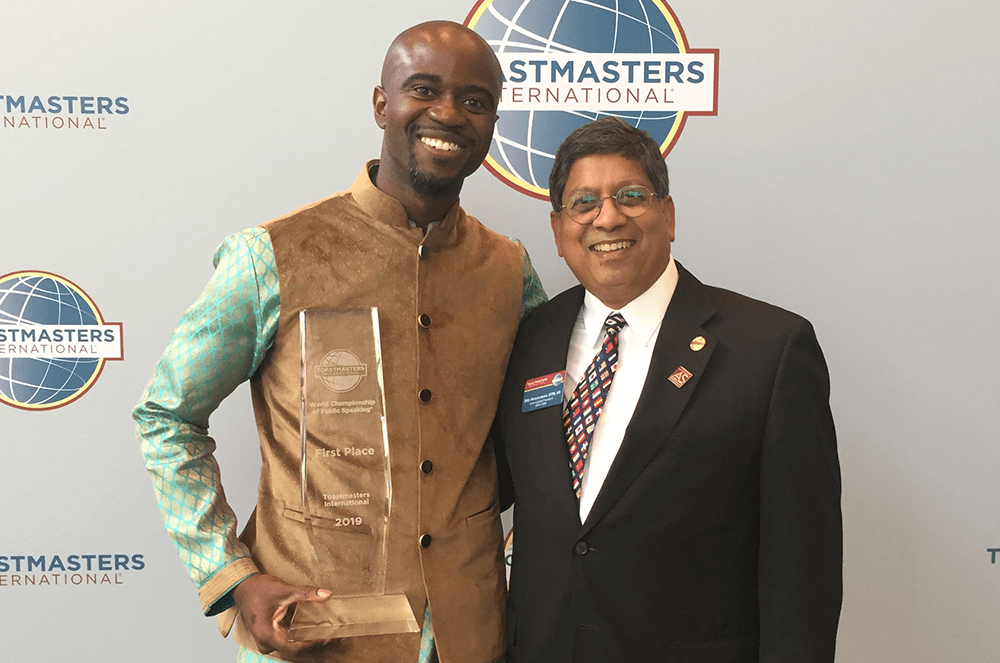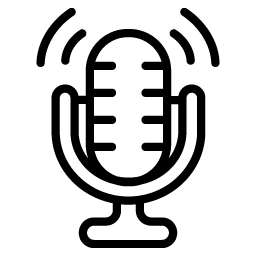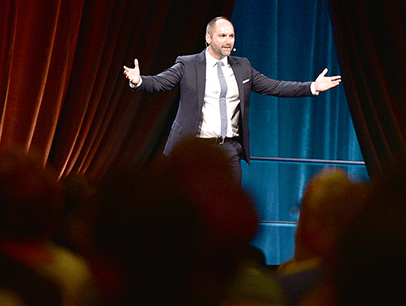
Some people may be surprised to learn that a decade before serving as Toastmasters International President from 2005-2006, I spent five years competing in the International Speech Contest. I gained invaluable experience and insights from these competitions, which resulted in five District level titles, two regional titles, two appearances at the World Championship of Public Speaking® (WCPS), and winning second place at the 1992 WCPS.
In 1994 I stopped competing and entered the leadership track, which I have never left. But a new joy I gained was coaching and mentoring aspiring contestants. I’ve had the pleasure of coaching and mentoring members at all levels of the International Speech Contest, as well as Accredited Speaker candidates.
The skills and insights you gain from speech contests are invaluable, and I encourage everyone to consider competing at some point. Over the years, I’ve prepared what I consider to be my “secrets” to winning at the International Speech Contest.
Study Other Speakers
Before deciding on your topic or writing your speech which might enable you to get to the World Championship of Public Speaking, I recommend learning from champion speakers. My role models were the individuals who had achieved my goal—the World Champions. If this is your goal as well, study the recordings of previous World Championships, particularly the top three winners in the past three years, although you can learn from the WCPS speeches of any period.
Notice their speech topics, content, delivery, language, use of stories, pictures, props, use of space and stage, body language, engagement with the audience, and other ways that they convey their message, connect with the audience, and create a memorable experience.
Choose an Engaging Topic
You’ll want to find a topic that is important to you and the audience, and one that creates value for the audience. Think of it as a three-component Venn diagram involving you, the audience, and value to the audience. When all three are strong, you have a WCPS-worthy topic.
My experience and observations are that Toastmasters audiences want to be inspired, motivated, entertained, and touched in the heart and mind.
My experience and observations are that Toastmasters audiences want to be inspired, motivated, entertained, and touched in the heart and mind. They do not want to have to think too much or be drawn into controversial topics that divide people. For Toastmasters speech contests, my advice is keep it simple, keep it clear, and make it meaningful.
Understand the Judge’s Guide
Judges are the most important subset of your audience—they choose the best speaker and will be looking for reasons to take points off to find the first-, second-, and third-place winners.
Study the International Speech Contest Judge’s Guide and Ballot.
Notice that 40% of points are for content, 40% for speech development, and 20% for language. As you develop your speech, consider how it might be measured against this guide. Where might you be penalized? What must you do to maximize the points for each section?
Develop Your Speech
There is an old piece of advice to speakers: “Don’t try to impress, just express.” In other words, keep it simple, and above all, be very clear about what you are saying.
One way to ensure clarity and focus is to write out a phrase or sentence that captures the central idea of your speech. This is the essence of your message. For example, the central idea of my 1992 WCPS speech was “Love makes the connection among human beings.” From that, I chose the speech title: “Love Makes the Connection.” The body of your speech should clarify and illuminate the central idea.
Develop your speech in a way that will not only keep it simple and clear but also makes your message relevant to the audience and engages them. Three ways to do this are storytelling, appropriate humor, and rhetoric. Personal stories are the most effective way to make your point, establish your authenticity, and engage the emotions of your audience. Effective humor and jokes connect your audience to you, making them relate to your message. Finally, don’t forget rhetorical tools, such as repetition, parallel structure, triads, similes, metaphors, rhymes, and quotations. Judiciously choose what works best for you.

Listen to The Toastmasters Podcast for more winning wisdom from Dilip Abayasekara.
To Memorize or Not?
There are different schools of thought on whether or not contestants should memorize their speech. One problem with memorizing is that it can end up sounding canned or mechanical. There’s also the risk that if you forget one of the sentences, your mind might go blank. On the other hand, if you don’t memorize, but instead have a general idea of what you want to convey, you risk rambling, or going too long and fumbling for words.
Given the strict time limits, my opinion is that every word counts, and therefore every word and every pause need to be known by memory. My approach includes 1) memorize a paragraph at a time, adding a previously memorized paragraph to a new paragraph, and 2) continually repeat certain words and phrases to drive the words into memory, while making them sound natural.
Get Your Timing Down
The International Speech Contest rules require that a speech not be less than 4 minutes 30 seconds and no longer than 7 minutes 30 seconds. Within that time frame, you must fit in an opening, body, and close. How do you ensure you meet those requirements? My preference is to practice the speech out loud, time it, adjust, and do it over again and again.
The skills and insights you gain from speech contests is invaluable, and I encourage everyone to consider competing at some point.
Note in your speech text where the 5-, 6-, and 7- minute times are reached. Those are the places where you expect to see the green, yellow, and red lights. It will take many rehearsals to get this down right. Then, at the actual contest, pay attention to when the lights come on. If the green light comes on where you expect it, you know you doing fine. If it comes on too early, then you may have to shorten the speech by dropping a line or two. If it comes on later than you expect, you have plenty of time to complete the speech within the time limit.
Rehearse and Get Feedback
Once you feel good about the draft of your speech, invite feedback from different audiences. After I won my club contest, the members became incredibly useful in helping me further refine and polish my speech. When I needed to prepare for regional contests (semifinals), I reached out to other clubs in my District and in nearby Districts who kindly allowed me to rehearse my speech and gave me feedback.
Of course, the challenge then becomes sifting through the feedback and discerning what will improve the speech. It helps to know yourself, know the audience, and clearly know the central idea. Receive all feedback with gratitude, listen carefully, and search for gems of insights that can move your speech to a higher level. Speech improvement is not a solo job. Don’t shy away from evaluations. Seek them, learn from them, and be grateful for them.
My 1992 WCPS speech went through 18 revisions and 360 rehearsals, yet I think I was able to deliver it as if it was the first time I was giving it. The system works!
Having trouble viewing? Click here.
Have the Right Attitude
Competition can limit growth if you feel that anything less than getting first place means you’ve lost. In fact, contestants who have the mindset that they are only competing with themselves come out as winners, because every contest becomes a learning experience. This attitude allows you to let go of feeling like you “have” to win, and instead enjoy the opportunity to deliver a message of value to the audience. This attitude can be difficult to cultivate because it goes counter to many people’s idea of winning. So how does one claim it?
Here are some understandings that have helped me:
- In this world, there will always be speakers who are better than I am, as well as those who are not as skilled.
- My task is to keep improving as a speaker and strive to give a better speech on the day of the competition than I had ever done before.
- If I won the contest, wonderful! Enjoy the feeling and show gratitude to those who helped me.
- If I did not place in the contest, I reflect on what I might need to learn to become better and who might be able to help me.
- I learned new skills to help me with my speeches. Most helpful to me are meditation, visualization, and neurolinguistic programming. All these helped me to become a better person as well as a better speaker.
- I knew that I had “let go” when I found myself enjoying the competition experience without feeling that I had to win first place.
One of the great learning experiences that Toastmasters offers is speech competition. I urge you to take advantage of it. It will cause you to stretch, discover new possibilities, and make you a better communicator and leader. What I have dubbed “secrets” are not really secrets, but realizations that have worked for me and my mentees many times. Not only that but they have helped change my life for the better. I hope you will find them helpful for your Toastmasters journey also.
Speak on!
Dilip R. Abayasekara, DTM, AS, PIP is a Past International President of Toastmasters, and a two-time finalist at the World Championship of Public Speaking, receiving second place at the 1992 WCPS. He earned Toastmasters Accredited Speaker designation in 1996 and ran a professional speaking and speech coaching business for 22 years, served as a pastor, and is now retired.
Related Articles

Communication
The True Value of Speech Contests

Toastmasters News
Meet the Winners of the 2023 World Championship of Public Speaking

Personal Growth



 Previous
Previous

 Previous Article
Previous Article